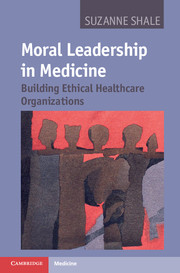Book contents
- Frontmatter
- Contents
- Preface
- Acknowledgements
- Chapter 1 Why medicine needs moral leaders
- Chapter 2 Creating an organizational narrative
- Chapter 3 Understanding normative expectations in medical moral leadership
- Prologue to Chapters 4 and 5
- Chapter 4 Expressing fiduciary, bureaucratic and collegial propriety
- Chapter 5 Expressing inquisitorial and restorative propriety
- Epilogue to Chapters 4 and 5
- Chapter 6 Understanding organizational moral narrative
- Chapter 7 Moral leadership for ethical organizations
- Appendix 1 How the research was done
- Appendix 2 Accountability for clinical performance: individuals and organizations
- Appendix 3 A brief guide to commonly used ethical frameworks
- Index
- References
Chapter 6 - Understanding organizational moral narrative
Published online by Cambridge University Press: 05 January 2012
- Frontmatter
- Contents
- Preface
- Acknowledgements
- Chapter 1 Why medicine needs moral leaders
- Chapter 2 Creating an organizational narrative
- Chapter 3 Understanding normative expectations in medical moral leadership
- Prologue to Chapters 4 and 5
- Chapter 4 Expressing fiduciary, bureaucratic and collegial propriety
- Chapter 5 Expressing inquisitorial and restorative propriety
- Epilogue to Chapters 4 and 5
- Chapter 6 Understanding organizational moral narrative
- Chapter 7 Moral leadership for ethical organizations
- Appendix 1 How the research was done
- Appendix 2 Accountability for clinical performance: individuals and organizations
- Appendix 3 A brief guide to commonly used ethical frameworks
- Index
- References
Summary
[A] man is always a teller of tales, he lives surrounded by his stories and the stories of others, he sees everything that happens to him through them; and he tries to live his own life as if he were telling a story [1].
Jean Paul Sartre's words above are often quoted in narrative social research, perhaps implying that such research carries Sartre's imprimatur or is at least consistent with his views. Interestingly, in the passage quoted the narrator continues with the observation ‘But you have to choose: live or tell’. Do we really need to make such a choice? Perhaps we must in some areas of life. But not, I think, where the purpose is moral leadership in medicine; then, the living of the story and the telling of the story are both equally vital. In this chapter I explore what, exactly, the terms ‘narrative’, ‘shared narrative’ and ‘moral narrative’ mean and I discuss in greater detail how organizational narratives appear to work. This chapter is one of the more theoretical in the book, and it is aimed at those readers with an interest in further exploring the conceptions of narrative that underpin my account of medical leadership.
Before proceeding to my detailed examination of narrative, it is worth recalling some of the implications of treating moral leadership as a process of orchestrating organizational efforts to produce a fitting moral narrative. First, conceptualizing moral leadership as production of organizational narrative implies that a leaderly response to moral trouble entails facilitating many morally important decisions, rather than making just one; and that moral leadership is a continuous process of coordinating organizational responsiveness rather than a single action. Second, it invites us to focus on understanding the processes that might lead to credible, compelling, collective, moral narratives coming into existence. We begin to see that morally good outcomes, or moral failure, are produced through multiple social interactions in which normative expectations, reactive attitudes and the promptings of propriety play an important part. The upshot of the first two findings is that, third, we are obliged to revise common notions of moral or ethical expertise. Viewing moral or ethical leadership as skilful orchestration of a shared narrative, we see that the necessary expertise is as likely to reside in interpersonal knowledge and dexterity as it is in personal moral wisdom; and that moral expertise is as likely to reside in the dynamic systems that drive group behaviour as it is in the cognitive sophistication of individuals.
- Type
- Chapter
- Information
- Moral Leadership in MedicineBuilding Ethical Healthcare Organizations, pp. 193 - 221Publisher: Cambridge University PressPrint publication year: 2011



